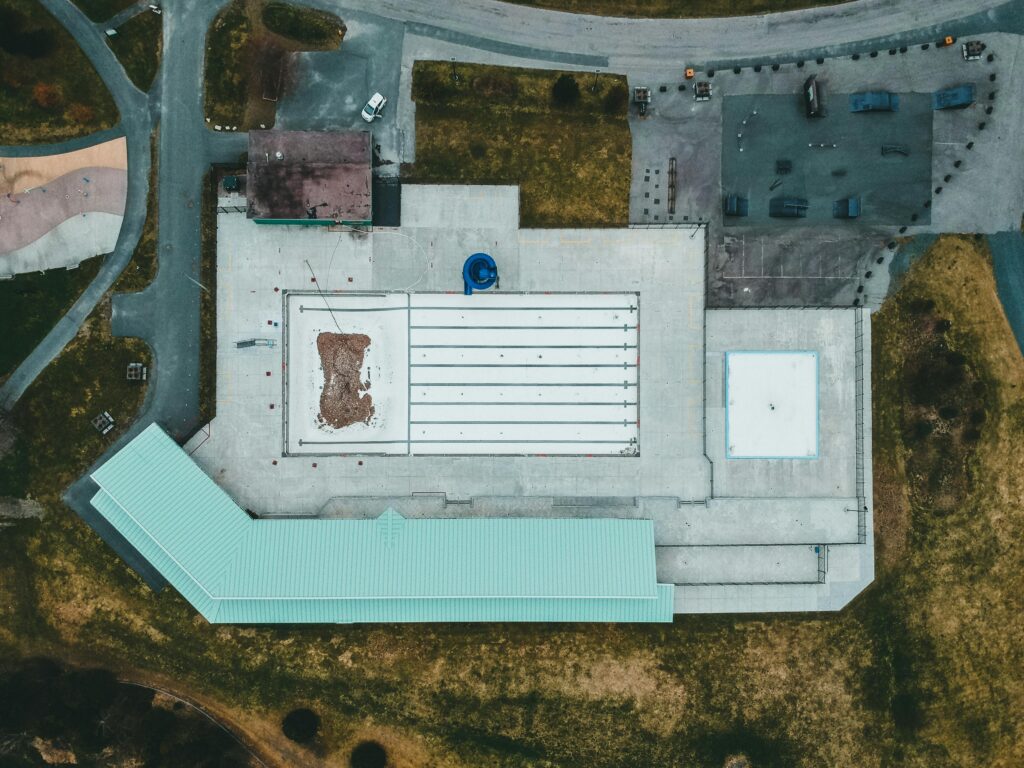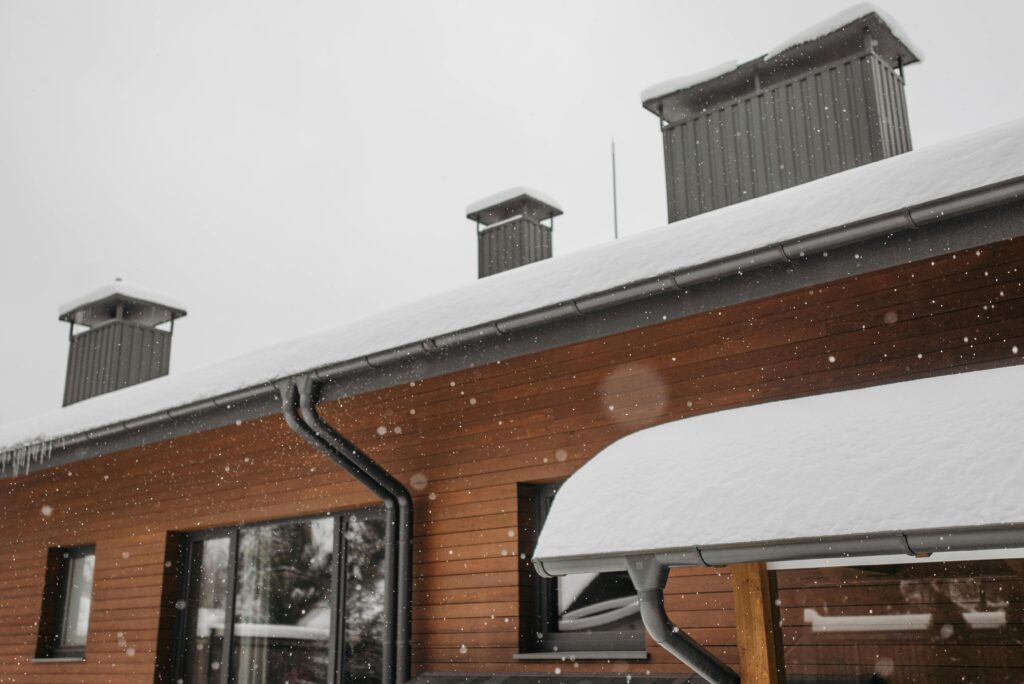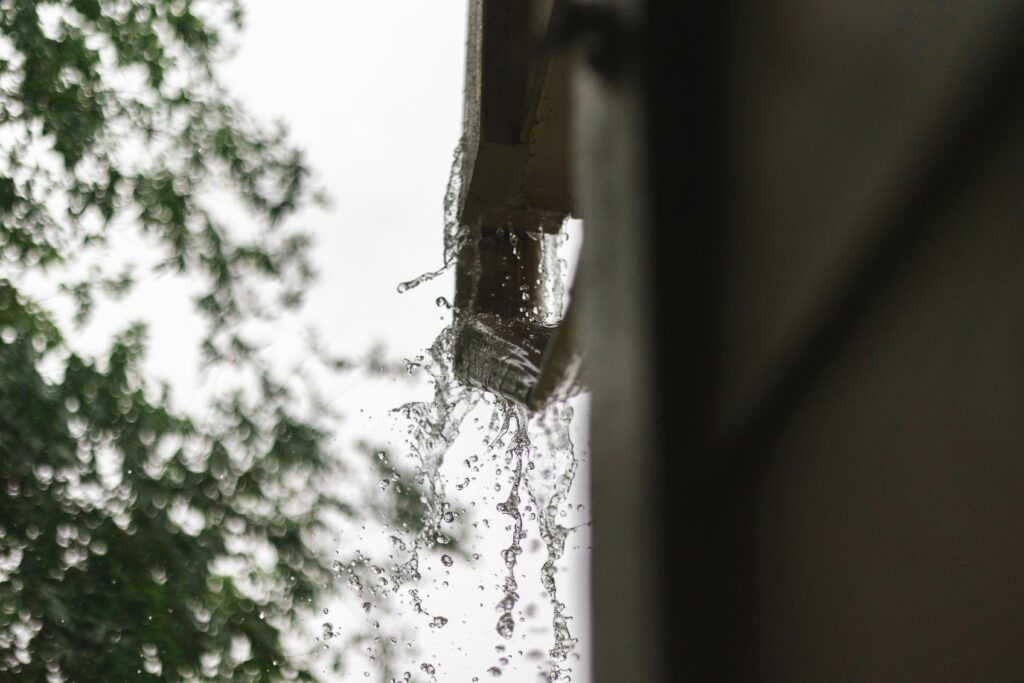Summary of Keypoints
- Primary structural differences: Residential roofs are typically pitched for aesthetics and natural water runoff, while commercial roofs are usually flat or low-sloped to support large surface areas, rooftop access, and internal drainage systems.
- Roofing materials used: Commercial roofs commonly use single-ply membranes (TPO, PVC, EPDM), built-up roofing, modified bitumen, or metal to withstand foot traffic, chemicals, and heat. Residential roofs more often use asphalt shingles, tile, cedar, slate, or metal, prioritizing appearance and longevity.
- Maintenance requirements: Commercial roofs generally require more frequent and intensive maintenance due to larger surface areas, foot traffic, debris exposure, and environmental stressors. Residential roof maintenance varies by material, age, and climate but is typically less demanding.
- Installation complexity: Residential roofs are often installed quickly using straightforward methods like nailing shingles, while commercial roofs involve more complex systems, larger crews, longer timelines, and specialized installation methods such as adhesives, mechanical fasteners, or ballast.
- Professional installation importance: Both residential and commercial roofing systems require experienced professionals to ensure proper installation, performance, durability, and long-term protection of the property.
Whether you’re looking to construct a large commercial complex or designing your dream home, understanding the differences between residential and commercial roofing can help you choose the right roof for your property.
Roofing materials, maintenance, and installation techniques vary widely between commercial and residential applications. So what are the major differences between these systems? Keep reading to find out!
Key Differences: Commercial vs. Residential Roofing
The four key differences between commercial roofing systems and residential roofs are:
- The roof type
- Roof materials
- Maintenance requirements
- Installation techniques
Let’s look at each of these differences in more detail.
Difference #1: Roof Types in Commercial and Residential Buildings
One of the major differences between residential and commercial roofs is their roof type. While residential roofs tend to be pitched, commercial roofs are commonly flat or low-sloped. Each system drains water, but sometimes in different ways.
Pitched roofs drain water via a gutter system that diverts collected water away from the foundation. Some low-sloped roofs may use gutter systems or have an internal drainage system that directs water away from the building.
Flat roofs are most common on large buildings, such as warehouses or commercial complexes, where people may need to frequently access the rooftop. Pitched roofs are more aesthetic for residential buildings and don’t need to sustain the foot traffic that residential properties commonly do.
Difference #2: Roofing Materials Used in Commercial and Residential Properties
The choice of roofing materials significantly varies between commercial and residential roofing.
Commercial buildings with flat roofs may use single-ply membranes, such as thermoplastic polyolefin (TPO), polyvinyl chloride (PVC), or ethylene propylene diene monomer (EPDM). Those with asphalt-based roofing systems may use built-up roofing (BUR) or modified bitumen. Some commercial properties may also have metal roofing.
Residential properties have a wider range of roofing materials, including asphalt shingles, concrete or tile shingles, cedar shingles, or metal roofing. Slate is another popular roofing option for residential properties due to its longevity and aesthetics.
Although residential and commercial roofing materials have similar lifespans, commercial roofs often require more robust materials to withstand corrosive chemicals, heat, and foot traffic, depending on the building and its purposes.
Difference #3: Maintenance Requirements in Commercial vs. Residential Roofs
Maintenance is an essential aspect of both commercial and residential roofing systems. However, maintenance can vary significantly between the two. But why?
Commercial Roofing Maintenance
Commercial roofing systems are generally subject to more wear and tear than residential ones. This is because commercial properties often have flat roofs that need to sustain foot traffic, but it’s also because large commercial buildings cover more square footage, which means more roofing material that can sustain damage from debris during storms.
Commercial roofing systems may also be subject to harsh chemicals, heat, or grease, depending on their purpose, which can make their roofing systems wear out faster than roofs on residential properties.
The maintenance commercial roofing systems need will depend on the specific property, including its location, the age of the roof, and the roofing material used. For example, a commercial building with an older roof that gets a lot of sunlight and sustains heavy foot traffic will need more maintenance than a building in a shaded area that has a newer roof and little foot traffic.
Residential Roofing Maintenance
Residential roofs need maintenance, just like commercial roofs. And like commercial buildings, the care will depend on the age of the roof, the location of the home, and the quality of the materials used.
For example, a roof with low-quality asphalt shingles in a shaded area that receives lots of rain may need significantly more maintenance than a home with a high-quality metal roof that gets a mix of sun and rain.
Whether you have a commercial or residential roof, annual inspections from a professional roofing contractor are recommended, and bi-annual inspections are preferred. Commercial properties may need more frequent inspections depending on their unique roofing system.
Difference #4: Installation Complexity in Commercial & Residential Roofs
Another difference between residential and commercial roofs is the installation complexity. The type of roof, materials, and building size all matter when it comes to installing a roof on a residential or commercial property.
For example, while a residential roof may be able to be installed in a single day, larger commercial roofs may take multiple days or even weeks to fully install. Flat commercial roofs are also installed differently than residential pitched roofs, depending on the specific material.
While asphalt shingles are applied with nails, single-ply membranes on commercial buildings can be installed with adhesive, mechanical fasteners, such as screws, or ballast, which means the system is held in place with heavy rocks or gravel.
No matter what type of roofing system you have, having an experienced professional install the roof with high-quality materials makes all the difference for your roof’s aesthetics, performance, and longevity.
Get a Quote for Your Commercial Roof
Although residential and commercial roofing systems differ, they are similar in that they both require a professional to properly install and maintain. Get a quote for your commercial roofing system with CDS Roofing. We offer a variety of materials and have decades of expertise to deliver a robust roof designed to last.



